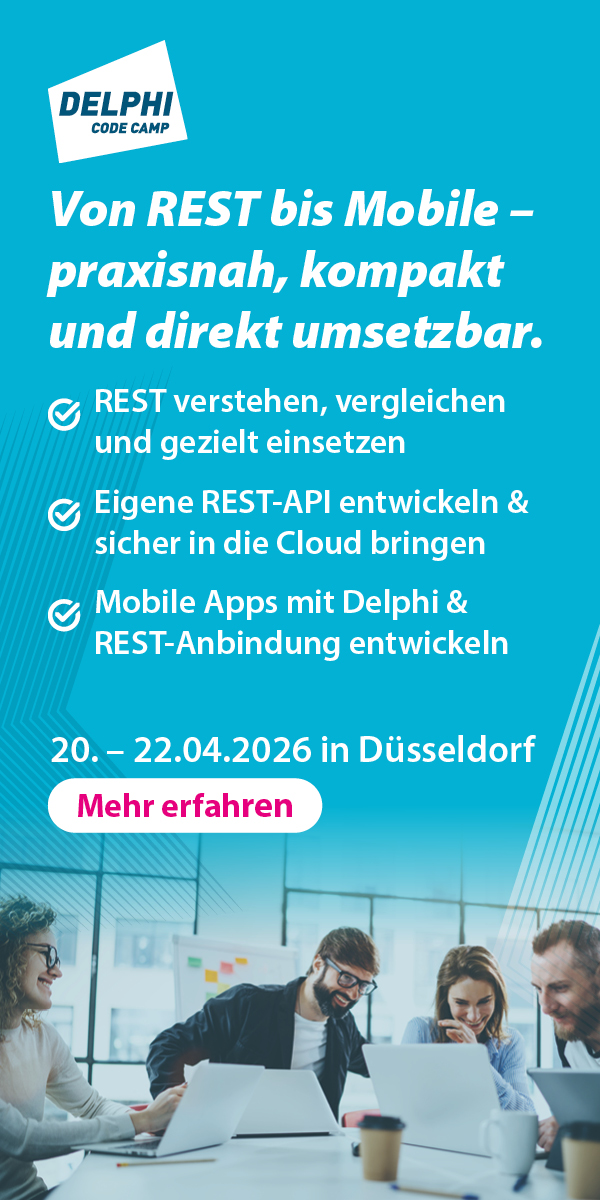JAXenter: Let’s start with a little status update: Where does the Delphi development stand, what is being worked on, what releases are planned?
Marco Cantu: Delphi development is still going strong on Windows with full support of Windows 10 along with older versions of the operating system, also thanks to the fact other vendors haven’t provided a migration path for existing applications.
Beside Windows, Embarcadero keeps focusing on creating a great multi-device experience with FireMonkey. FireMonkey is the only native compiled framework with single source applications for desktop and mobile.
Finally, we have been pushing our more recent multi-tier REST-based architecture, RAD Server, which wants to bring easy and fast development for web services. All of these solutions let developers reuse a lot of existing code if they’ve used Delphi in the past.
JAXenter: At EKON 22, you will give a session entitled “The Delphi Language Evolution“. Indeed, the landscape is in motion with themes such as Cloud, Mobile, IoT, Container, Machine Learning, etc. Which topics are currently the focus of the Delphi community?
Marco Cantu: The focus of this session is on the core language and its modernization. We are very happy with the overall features and power of the language. However, there are many areas which can be improved and we want to focus on that. While these features are not strictly related with the industry trends, they help reinforce Delphi position as a compiled and efficient language suitable for all modern needs.
Deep platform integration helps with Mobile and IoT. For IoT, we have extensive support for core connectivity and even ready to use IoT components. Native mobile helps performance and battery usage. But energy saving (or CPU cycles saving) is also becoming important for cloud architectures, so again compiled code has advantages.
JAXenter: From your point of view, are there any topics that should be covered even more in the future? Where is there still some catching up to do?
Marco Cantu: There are certainly many areas Delphi developers are just starting to tackle. Given many are focused on legacy existing large business apps (critical to keep many companies running) the adoption of new technologies like, say, blockchain or machine learning is a bit slower compared to other environments. But we are seeing many new libraries in these areas, and this is promising. We are very happy when we see our developers community help pushing the product in new directions.
JAXenter: In your keynote, you will present the development of REST and JSON web services with the RAD server. This also includes new web and JavaScript features. Can you give us an example?
Marco Cantu: How to best build a web application is a topic we could spend months debating. We could probably never reach consensus on what’s the best approach. Also, the JavaScript space is continually reinventing itself in terms of libraries.
Personally, I don’t believe Delphi should be used for building web UIs. There are many nice and clean technologies based on HTML, CSS, and JavaScript which get the job done nicely. I know some developers like using a single tool and not having to learn new ones, so I’m happy we have third party vendors offering integrated solutions.
For me, the best approach (for larger, public applications, at least) is to have a solid REST and JSON based backend, like RAD Server offers, and couple it with a JavaScript app. There are many alternatives there, from Angular to React to Vue. However, I’m likely going to demo the use of ExtJS, given our company owns this solid and stable JavaScript framework!
JAXenter: Another of your sessions is called “Building and Deploying Delphi Applications to Platform Stores”. What is your core message here?
Marco Cantu: The key concepts is App Stores have changed the way developers distribute and sell applications. They have also changed the way developers make money out of their work. This has been revolutionary for the mobile space. Microsoft is now trying to push and promote the same concept for Windows 10, something obvious if you consider the Windows 10 S release.
Delphi has integrated support in the IDE for building the artifacts and deployment files needed for iOS and Android mobile stores and for Windows Store, using the desktop bridge. I have personally deployed a few apps to these stores. This session would also focus on my personal experience and some gotchas with the process.
Thank you!
Marco Cantu is the Delphi Product Manager, a long time Delphi expert and the best-selling author of 20+ books on the product. Follow him on Twitter @marcocantu.





